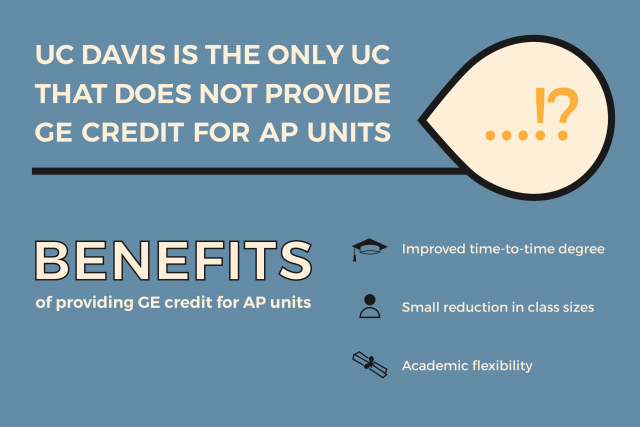
Emails from two administrators show alleged obstruction of proposal by administration
Currently, UC Davis is the only UC school that does not provide GE credit for passing AP scores. In response to this, ASUCD President Alex Lee proposed Senate Resolution #9, which requests that UC Davis award General Education (GE) credit for students who earned passing scores on Advanced Placement (AP) classes in high school.
The current proposal is a part of the platform that Lee campaigned on when he ran for ASUCD president. Only the ASUCD president can make proposals, such as Senate Resolution #9, to the Academic Senate, and they can only make that proposal once it has been approved by the ASUCD Senate. Then, the proposal is sent to the Academic Senate for consideration.
However, Lee has fears about the future of his proposal because of two emails which were obtained by The Aggie. These emails allegedly show an unwillingness of the administration and Academic Senate to cooperate with student requests for GE/AP reform.
“This is the fun case of, ‘you have to check who you are sending your emails to,’” Lee said. “[…] This kind of highlights in writing that [Academic Senate Chair] Rachael [Goodhue] has been kind of evasive of the student government and students in general. […] This [email from Vice Chancellor of Student Affairs Adela De La Torre also] shows in writing that they basically didn’t want to take it seriously in the first place.”
The first email Lee mentioned is an email from de la Torre addressed to Goodhue.
“Rachel [sic] I will ask Milt to manage Alex,” de la Torre said in the email. “He is no longer ASUCD President. A new one was elected last Friday so this may be the end of the conversation as well.”
De la Torre, when prompted on this email, stated that she was simply asking Vice Chancellor Milton Lang and ASUCD Business Manager Janice Corbett to manage the “transitional issue” between new ASUCD executive administrations.
“The issue is primarily a transitional issue,” de la Torre said. “When the president steps down, the issue really becomes one of, who you need to communicate with. The issues becomes, in the portfolio, Milt and Janice are the ones who manage the discussions and the meetings. […] We have to be very careful to ensure that the transition period is one where, quite frankly, Alex provides the information transfers to the new president and the vice president.”
The second email Lee mentioned is one from Goodhue.
“He’s been told that we need to manage workload, and that this is an internal request that doesn’t have an external deadline, unlike something from systemwide or the administration,” Goodhue said in the email. “It’s a request to change an internal Davis Division of the Academic Senate policy. I’m not responding to any more emails on this matter from Alex. He’s wasting my time. If SA judges a communication to be important, please have him send it to one of you, and you forward it to me.”
Goodhue explained her email as simply an effort to control conversation and keep it, “productive.”
“I and the Senate office had explained to Alex, to President Lee, repeatedly that ASUCD’s request was under consideration,” Goodhue said. “At that point, communication had stopped being productive.”
Lee’s GE/AP proposal builds off of existing frameworks within the university. GE credit would be awarded to students based on already determined course equivalencies. Students who earn passing scores on AP exams are given certain numbers of units for each exam and barred from taking an equivalent course at UC Davis. Instead of just receiving units toward graduation, students would also receive similar or identical GE credit for those equivalent courses.
Without specifically talking about the merits of this proposal, Goodhue did speak about work toward reducing time-to-degree, among two other things.
“I would like to reiterate that time-to-degree is very important to the Senate and very important to campus,” Goodhue said. “I will also say that it was nice to get a concrete proposal from ASUCD. The last thing I’ll say is a plug — the ASUCD has places for representatives to senate committees. The ASUCD has struggled to fill them. I strongly, strongly encourage students who want to become more involved in how the university works to apply to participate in these committees. It would be great to see them at the meetings.”
This final point about filling ASUCD spots on Academic Senate committees was also brought up by Lee, who described some of the challenges students face on these committees.
“On their committees [they] have ex-officio, non-voting, basically observer seats, that ASUCD tries to fill,” Lee said. “I say try because they are very daunting for students. Not all committees are, but some committees are not very welcoming to students because they talk for three hours about tenure for faculty, or something. It’s not accessible. But we have student reps on there.”
Update (3/16/17, 10 p.m.): Since the initial publication of this article, the UC Davis Division of the Academic Senate released a timeline on how the ASUCD proposal will be handled. The Academic Senate will release a status update in June but expects to take through Fall Quarter 2017 to discuss the proposal fully and make a final recommendation.
Written by: Kenton Goldsby — campus@theaggie.org



